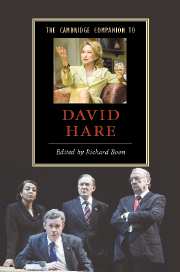7 - Hare in collaboration
Writing dialogues
from Part II - Working with Hare
Published online by Cambridge University Press: 28 April 2008
Summary
What humanity is can be properly grasped only in its reciprocity. I feel that the debate itself is what is interesting.
Playwrighting can be a more sociable art than its popular image might imply. Perhaps the isolation of the writer's role is its most obvious feature: Hare himself writes of realising, at the end of the 1970s, 'what more intelligent writers know from the start. I remember thinking: “Oh I see. I'm alone.”' He reflects on the provisional nature of relationships with other theatre makers, such as actors and directors. Yet if it was during the 1970s that Hare had most sought, as he puts it, 'to reconcile some kind of group impulse with the task of writing individual plays', this openness to dialogue continues to be evident in his work, particularly in more recent theatre writing.
Perhaps because of its frequent, though by no means inevitable, association with collective authorship, the idea of playwrights working in ‘collaboration’ (whether with each other, or with an ensemble, or with others) can sometimes be associated with notions of artistic compromise or of inept ‘theatre designed by a committee’.
- Type
- Chapter
- Information
- The Cambridge Companion to David Hare , pp. 109 - 122Publisher: Cambridge University PressPrint publication year: 2007
- 1
- Cited by

